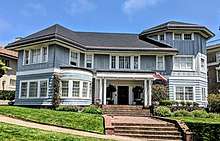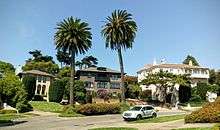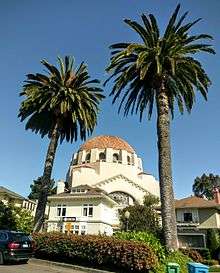Presidio Terrace
Presidio Terrace is a small, extremely affluent [1] neighborhood in San Francisco that was the first of the master-planned communities built in the western part of the city. It consists of 36 large lots laid out around a single privately owned street, also called Presidio Terrace, which takes the form of a two-way access street leading to a one-way elliptical cul-de-sac. Access is off Arguello Boulevard.


History
Construction started in 1905, just south of and adjacent to the Presidio, a former army base that is now a part of the Golden Gate National Recreation Area. Amenities unusual for residential developments of that time included electric street lights, underground utilities and roads designed for auto traffic.[2] The neighborhood was developed by the firm of Baldwin & Howell, a leading San Francisco real estate development company.[3] It thrived following the 1906 San Francisco earthquake as prosperous families rebuilt outside the destroyed neighborhoods in the eastern part of the city.
Presidio Terrace was originally marketed to white residents only. "There is only one spot in San Francisco where only Caucasians are permitted to buy or lease real estate or where they may reside. That place is Presidio Terrace", according to a 1906 brochure distributed by the developer.[4][5] A 1948 Supreme Court case, Shelley v. Kraemer, which banned enforcement of racial covenants in housing, invalidated restrictions of this type nationwide.
In 2015, as a result of delinquent non-payment of county property taxes by the homeowners association after a mix-up where tax bills were being sent to a defunct accounting firm on Kearney Street, a San Jose couple, Tina Lam and Michael Cheng, were able to purchase the street, sidewalks and all other “common ground", including garden islands and palm trees, for $90,000. Worried that the new property owners would charge them for parking in the 120 parking spaces on the street, the homeowners complained to San Francisco Board of Supervisors asking that the sale be voided.[6][7] In addition the British Consulate, which has owned a house on the street as a consular residence since 2003, raised security concerns.[8] On November 28, 2017 the Board of Supervisors voted 7-4 to reverse the sale, reverting ownership to the homeowners.[9] After the vote, Supervisor Mark Farrell referred to the couple as "bottom-feeding pirates attempting to extort and hold San Francisco residents hostage".[10]
In April, 2018, the San Francisco Chronicle reported that the municipal government had failed to bill the homeowner's association for water used for irrigation of landscaping for 113 years. In the preceding ten years, the cost of the water was $59,548, and the homeowner's association promptly paid that amount. [11]
Surroundings

Temple Emanu-El was built on an adjacent parcel on the northwest corner of Arguello Boulevard and Lake Street in 1925, and the Little Sisters of the Poor is also close by.[12]
Architecture
Architectural styles in the neighborhood include Beaux-Arts, Mission Revival, and Tudor Revival. Julia Morgan designed an Italian Renaissance villa in Presidio Terrace in 1909.[13] A plan to modernize the architecture of one house in the 1990s aroused objections by neighbors.[5]
Notable residents
Many notable San Franciscans have lived in Presidio Terrace over the years, including San Francisco Mayor Joseph Alioto, Ms. Claribel Rapp and her first and second husbands, Messrs Elmer G. Beckstrom and the former Peruvian Ambassador to the United States Fernando Berckemeyer Pazos, United States Congresswoman and first female Speaker of the House Nancy Pelosi and Senator Dianne Feinstein and her husband, financier Richard C. Blum,[14] and novelist and newspaper columnist Merla Zellerbach.
References
- Har, Janie (2017-11-28). "Rich San Francisco homeowners get sold-off street back". Washington Post. ISSN 0190-8286. Retrieved 2017-11-30.
- Johung, Jennifer (2016). Landscapes of Mobility: Culture, Politics, and Placemaking. Routledge. ISBN 9781317108061.
- "Guide to the Baldwin & Howell Records". Online Archive of California. California Digital Archive.
The real estate firm of Archibald S. Baldwin (1858-1924) and Josiah R. Howell (1868-1916) was one of the most important residential development companies in San Francisco and the Bay Area between 1890 and 1940. Baldwin & Howell was instrumental in the development of such San Francisco neighborhoods as Westwood Park, Forest Hills, Presidio Terrace, Balboa Park, the Richmond / Sunset, Forest Hill, West Portal, and St. Francis Wood.
- Keeling, Brock (May 24, 2016). "Home In Gated, Super-Exclusive Presidio Terrace Asks $16.9 Million". Curbed San Francisco. Retrieved August 8, 2017.
- Chamings, Andrew (March 10, 2020). "The racist history of San Francisco's bougiest street". San Francisco Chronicle.
- Matier, Phil; Ross, Andy (August 7, 2017). "Rich SF residents get a shock: Someone bought their street". San Francisco Chronicle. Retrieved August 7, 2017.
- Magness, Josh (August 7, 2017). "Rich residents shocked their private street was sold because of a $14 HOA error". The Sacramento Bee. Retrieved August 7, 2017.
- Matier, Phil; Ross, Andy (December 3, 2017). "Undoing sale of rich SF street was a matter of national security for Britain". San Francisco Chronicle. Retrieved February 20, 2018.
- Swan, Rachel. "SF supes reverse sale, return private Presidio Terrace street to homeowners". SF Gate. San Francisco Chronicle. Retrieved December 5, 2017.
- Matier, Phil; Ross, Andy. "Rich residents who got SF street back will pay 12 cents a year in taxes". San Francisco Chronicle. Retrieved December 5, 2017.
- Matier, Phil; Ross, Andrew (April 4, 2018). "Tony San Francisco enclave drenched its greenery on city's dime for over a century". San Francisco Chronicle. Retrieved April 4, 2018.
- "Outside Lands Podcast - Western Neighborhoods Project - San Francisco History". www.outsidelands.org. Retrieved 2016-02-02.
- Wilson, Mark Anthony (2012). Julia Morgan: Architect of Beauty. Gibbs Smith. ISBN 9781423636540.
- Sandalow, Mark (2008). Madam Speaker: Nancy Pelosi's Life, Times, and Rise to Power. Rodale Press. p. 45. ISBN 9781605299693.
Further reading
- McGrew, Patrick (1995). The Historic Houses of Presidio Terrace, and the People Who Built Them. San Francisco: Friends of the Presidio Terrace Association. OCLC 34845160.
.svg.png)